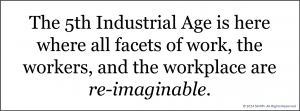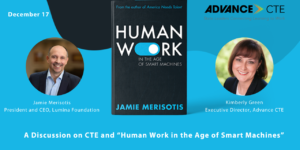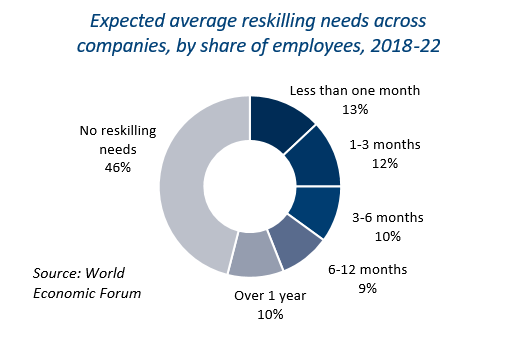 Advance CTE held a ‘fireside chat’ with Dr. Alex Alonso, Chief Knowledge Officer of the Society for Human Resources Management (SHRM), and Advance CTE Executive Director Kate Kreamer at our 2024 Spring Meeting that saw over 200 state Career Technical Education (CTE) leaders in attendance last month.
Advance CTE held a ‘fireside chat’ with Dr. Alex Alonso, Chief Knowledge Officer of the Society for Human Resources Management (SHRM), and Advance CTE Executive Director Kate Kreamer at our 2024 Spring Meeting that saw over 200 state Career Technical Education (CTE) leaders in attendance last month.
The two tackled this burning question of the future of work: How will Career Technical Education (CTE) continue to be the solution to ensuring success and security for all learners, especially amidst the imminent impacts of AI, the green economy, and evolving workplace trends?
Key Trends for the Future of Work
Dr. Alonso first presented newly released research conducted by SHRM drawing from data collected from a vast network of 2000 HR professionals, which, with the help of LLM (Large Language Models), aggregates major trends in the future of work and identifies the challenges facing employers today. Dr. Alonso unpacked several of these major trends, including:
Balancing Operational Efficiencies and Talent Needs
The challenges and problems companies face continue to become increasingly complex. That means that as the skills gap grows, the depth of that gap, or the “skills crater,” also grows, necessitating an even greater urgency for faster and more effective skills development. At the same time, amidst current inflationary pressures, there is a growing imperative to strike a balance between ensuring fair compensation for this high-demand talent and maintaining operational efficiency.
Training an Evolving Workforce
Because employers have a renewed focus on upskilling and reskilling, steps must be taken need to ensure alignment between training programs and the evolving needs of industries. This is a critical opportunity for CTE to be a leader and to meaningfully partner with industry.
Later on, during the fireside chat, Dr. Alonso elevated that the delivery of CTE programs might need to evolve to meet these trends and demands, not just in terms of content but also in how it’s delivered. Kate noted the shifting perspective on digital apprenticeships and virtual work-based learning– what was once seen as a compromise for accessibility is now being reconsidered as a viable content delivery option, especially as more jobs transition to partial or fully virtual settings.
Realizing the Full Potential of AI
AI has changed and reshaped the way that work is happening. Because it’s evolving right before our eyes, the challenge for employers and educators is to keep pace, all the while ensuring responsible integration into the workforce, particularly given the high potential for its misuse.
These challenges all point to one major takeaway, in Dr. Alonso’s words:
Embracing Change through AI
A significant portion of the fireside chat focused on the specific challenge of realizing the full potential of AI, and the broader theme of embracing change.
It’s a common worry: the idea that AI could eliminate job opportunities. Kate raised a crucial point: How do we leverage AI to create more opportunities rather than take opportunities away?
Dr. Alonso highlighted that while many job roles may diminish due to technological advancements, even more new jobs will emerge in the economy in the coming years. His argument: AI complements human intelligence rather than replacing it. AI should be viewed as a tool to aid in the creation of these new roles in tandem with human intelligence— “AI plus HI”
This dynamic shift isn’t about a loss of jobs, instead, it’s an evolution of industries and professions. Dr. Alonso also noted the attitude toward AI is changing as well; there’s a noticeable transition from apprehension to curiosity. People are increasingly inclined to engage in dialogues about AI, recognizing its potential to enhance both their industry and personal lives.
As we embrace these challenges and opportunities, CTE has a unique opportunity and advantage to equipping the future workforce. Explore further insights on SHRM’s research in their 2023-24 State of the Workplace Report.

Preparations are underway for Advance CTE’s 2024 Fall Meeting in Phoenix, AZ, October 21-23! Visit the event page to save the date and learn more.
Layla Alagic, digital communications associate



 Last week, Advance CTE hosted a discussion with Lumina Foundation’s President & CEO, Jamie Merisotis, on his new book, “Human Work in the Age of Smart Machines” and what it means for Career Technical Education (CTE). The conversation between Jamie Merisotis and Kimberly Green, Advance CTE’s Executive Director, was far reaching, covering topics from how we help learners gain empathy to the unlikelihood of a robot, zombie apocalypse.
Last week, Advance CTE hosted a discussion with Lumina Foundation’s President & CEO, Jamie Merisotis, on his new book, “Human Work in the Age of Smart Machines” and what it means for Career Technical Education (CTE). The conversation between Jamie Merisotis and Kimberly Green, Advance CTE’s Executive Director, was far reaching, covering topics from how we help learners gain empathy to the unlikelihood of a robot, zombie apocalypse. The answer is, it’s complicated. According to the
The answer is, it’s complicated. According to the